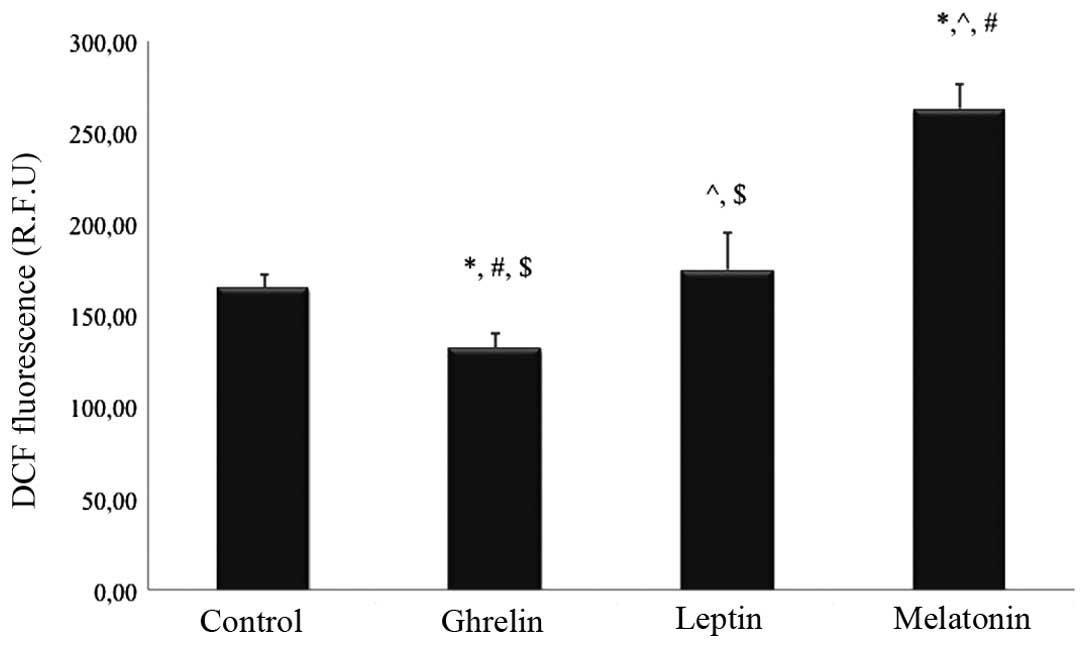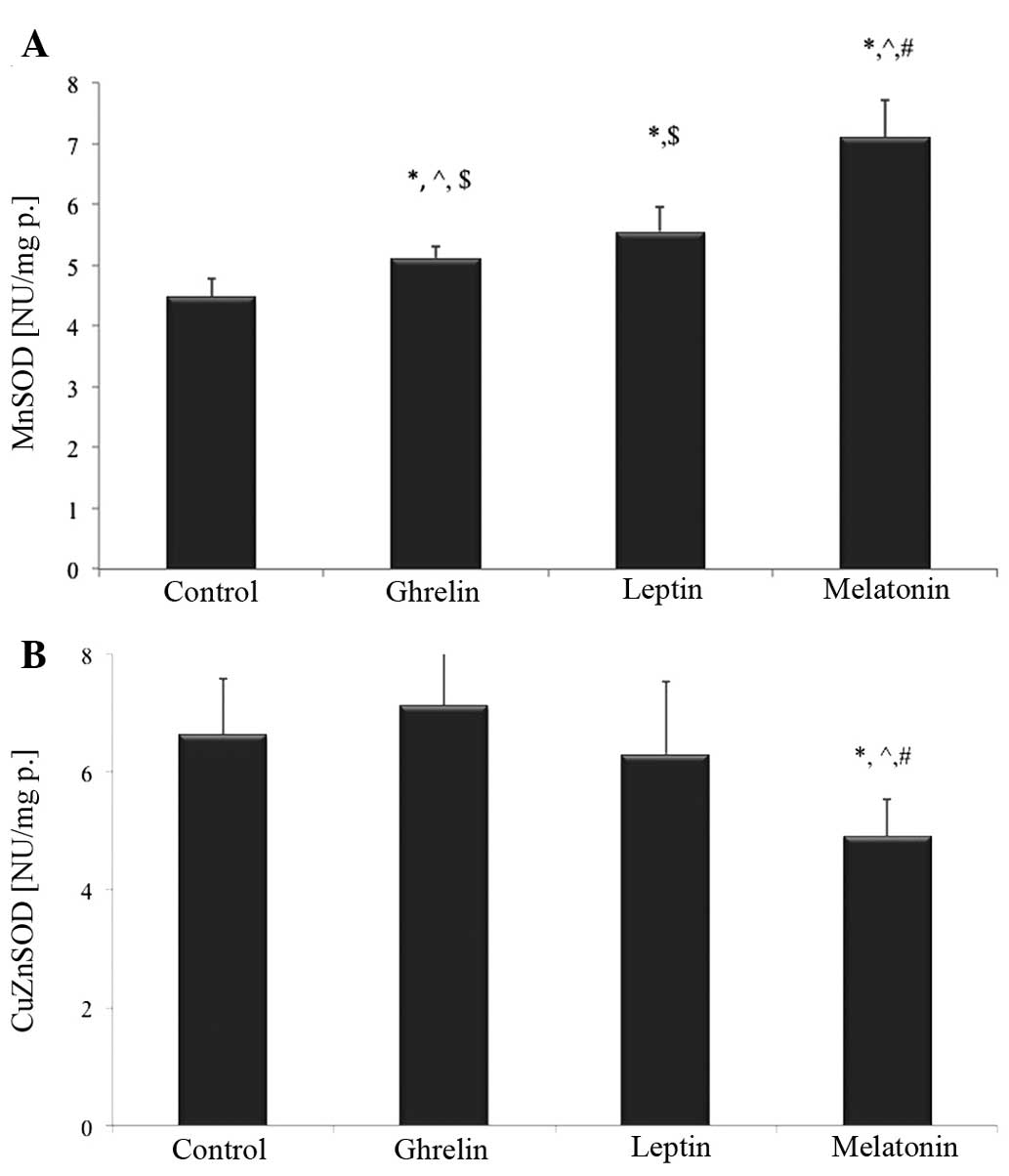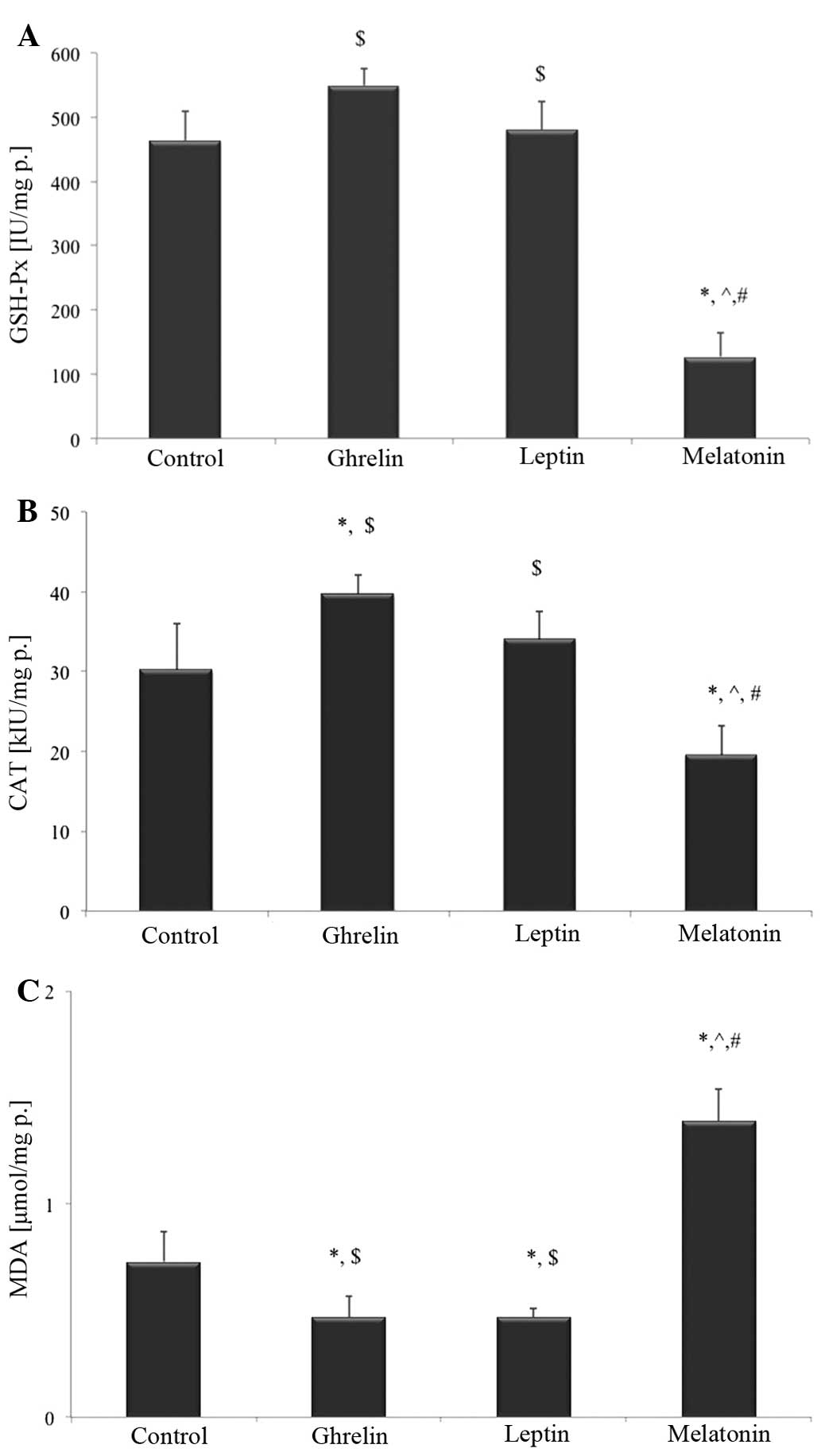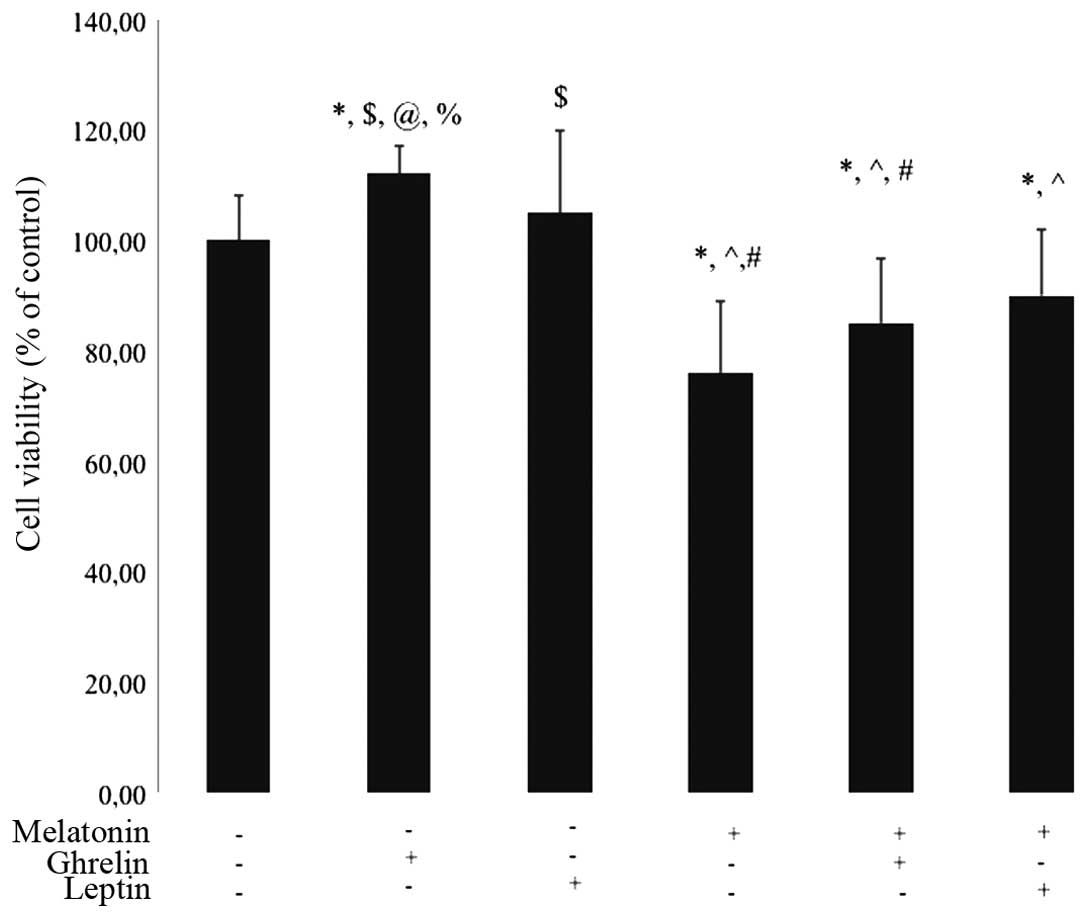|
1
|
Housa D, Housová J, Vernerová Z and
Haluzík M: Adipocytokines and cancer. Physiol Res. 55:233–244.
2006.
|
|
2
|
Pischon T, Nöthlings U and Boeing H:
Obesity and cancer. Proc Nutr Soc. 67:128–145. 2008. View Article : Google Scholar : PubMed/NCBI
|
|
3
|
Mantovani G, Macciò A, Madeddu C, et al:
Reactive oxygen species, antioxidant mechanisms and serum cytokine
levels in cancer patients: Impact of an antioxidant treatment. J
Cell Mol Med. 6:570–582. 2002. View Article : Google Scholar
|
|
4
|
Wiecek A, Kokot F, Chudek J and Adamczak
M: The adipose tissue - a novel endocrine organ of interest to the
nephrologist. Nephrol Dial Transplant. 17:191–195. 2002. View Article : Google Scholar : PubMed/NCBI
|
|
5
|
Kojima M, Hosoda H, Date Y, Nakazato M,
Matsuo H and Kangawa K: Ghrelin is a growth-hormone-releasing
acylated peptide from stomach. Nature. 402:656–660. 1999.
View Article : Google Scholar : PubMed/NCBI
|
|
6
|
van der Lely AJ, Tschöp M, Heiman ML and
Ghigo E: Biological, physiological, pathophysiological, and
pharmacological aspects of ghrelin. Endocr Rev. 25:426–457. 2004.
View Article : Google Scholar : PubMed/NCBI
|
|
7
|
Suzuki H, Matsuzaki J and Hibi T: Ghrelin
and oxidative stress in gastrointestinal tract. J Clin Biochem
Nutr. 48:122–125. 2011. View Article : Google Scholar : PubMed/NCBI
|
|
8
|
He X-T, Fan X-M and Zha X-L: Ghrelin
inhibits 5-fluorouracil-induced apoptosis in colonic cancer cells.
J Gastroenterol Hepatol. 26:1169–1173. 2011. View Article : Google Scholar : PubMed/NCBI
|
|
9
|
Nanzer AM, Khalaf S, Mozid AM, et al:
Ghrelin exerts a proliferative effect on a rat pituitary
somatotroph cell line via the mitogen-activated protein kinase
pathway. Eur J Endocrinol. 151:233–240. 2004. View Article : Google Scholar : PubMed/NCBI
|
|
10
|
Gnanapavan S, Kola B, Bustin SA, et al:
The tissue distribution of the mRNA of ghrelin and subtypes of its
receptor, GHS-R, in humans. J Clin Endocrinol Metab. 87:29882002.
View Article : Google Scholar : PubMed/NCBI
|
|
11
|
Tian PY and Fan XM: The proliferative
effects of ghrelin on human gastric cancer AGS cells. J Dig Dis.
13:453–458. 2012. View Article : Google Scholar : PubMed/NCBI
|
|
12
|
Barazzoni R, Zanetti M, Semolic A, Cattin
MR, Pirulli A, Cattin L and Guarnieri G: High-fat diet with
acyl-ghrelin treatment leads to weight gain with low inflammation,
high oxidative capacity and normal triglycerides in rat muscle.
PLoS One. 6:e262242011. View Article : Google Scholar : PubMed/NCBI
|
|
13
|
Konturek PC, Brzozowski T, Pajdo R, et al:
Ghrelin-a new gastroprotective factor in gastric mucosa. J Physiol
Pharmacol. 55:325–336. 2004.PubMed/NCBI
|
|
14
|
El Eter E, Al Tuwaijiri A, Hagar H and
Arafa M: In vivo and in vitro antioxidant activity of ghrelin:
Attenuation of gastric ischemic injury in the rat. J Gastroenterol
Hepatol. 22:1791–1799. 2007. View Article : Google Scholar : PubMed/NCBI
|
|
15
|
Zhang Y, Proenca R, Maffei M, Barone M,
Leopold L and Friedman JM: Positional cloning of the mouse obese
gene and its human homologue. Nature. 372:425–432. 1994. View Article : Google Scholar : PubMed/NCBI
|
|
16
|
Aloulou N, Bastuji-Garin S, Le Gouvello S,
et al: Involvement of the leptin receptor in the immune response in
intestinal cancer. Cancer Res. 68:9413–9422. 2008. View Article : Google Scholar : PubMed/NCBI
|
|
17
|
Trayhurn P and Beattie JH: Physiological
role of adipose tissue: White adipose tissue as an endocrine and
secretory organ. Proc Nutr Soc. 60:329–339. 2001. View Article : Google Scholar : PubMed/NCBI
|
|
18
|
Watson AM, Poloyac SM, Howard G and Blouin
RA: Effect of leptin on cytochrome P-450, conjugation, and
antioxidant enzymes in the ob/ob mouse. Drug Metab Dispos.
27:695–700. 1999.PubMed/NCBI
|
|
19
|
Yuan Y, Zhang J, Cai L, et al: Leptin
induces cell proliferation and reduces cell apoptosis by activating
c-myc in cervical cancer. Oncol Rep. 29:2291–2296. 2013.PubMed/NCBI
|
|
20
|
Wu X, Yan Q, Zhang Z, Du G and Wan X:
Acrp30 inhibits leptin-induced metastasis by downregulating the
JAK/STAT3 pathway via AMPK activation in aggressive SPEC-2
endometrial cancer cells. Oncol Rep. 27:1488–1496. 2012.PubMed/NCBI
|
|
21
|
Yoon K-W, Park S-Y, Kim J-Y, et al:
Leptin-induced adhesion and invasion in colorectal cancer cell
lines. Oncol Rep. 31:2493–2498. 2014.PubMed/NCBI
|
|
22
|
Brydon L, Petit L, Delagrange P, Strosberg
AD and Jockers R: Functional expression of MT2 (Mel1b) melatonin
receptors in human PAZ6 adipocytes. Endocrinology. 142:4264–4271.
2001. View Article : Google Scholar : PubMed/NCBI
|
|
23
|
Reiter RJ: Melatonin: Lowering the high
price of free radicals. News Physiol Sci. 15:246–250. 2000.
|
|
24
|
Baydaş G, Erçel E, Canatan H, Dönder E and
Akyol A: Effect of melatonin on oxidative status of rat brain,
liver and kidney tissues under constant light exposure. Cell
Biochem Funct. 19:37–41. 2001. View Article : Google Scholar
|
|
25
|
Rodriguez C, Mayo JC, Sainz RM, Antolín I,
Herrera F, Martín V and Reiter RJ: Regulation of antioxidant
enzymes: A significant role for melatonin. J Pineal Res. 36:1–9.
2004. View Article : Google Scholar
|
|
26
|
Martín-Renedo J, Mauriz JL, Jorquera F,
Ruiz-Andrés O, González P and González-Gallego J: Melatonin induces
cell cycle arrest and apoptosis in hepatocarcinoma HepG2 cell line.
J Pineal Res. 45:532–540. 2008. View Article : Google Scholar : PubMed/NCBI
|
|
27
|
Fan L-L, Sun G-P, Wei W, Wang Z-G, Ge L,
Fu W-Z and Wang H: Melatonin and doxorubicin synergistically induce
cell apoptosis in human hepatoma cell lines. World J Gastroenterol.
16:1473–1481. 2010. View Article : Google Scholar : PubMed/NCBI
|
|
28
|
Osseni RA, Rat P, Bogdan A, Warnet JM and
Touitou Y: Evidence of prooxidant and antioxidant action of
melatonin on human liver cell line HepG2. Life Sci. 68:387–399.
2000. View Article : Google Scholar
|
|
29
|
Petranka J, Baldwin W, Biermann J, Jayadev
S, Barrett JC and Murphy E: The oncostatic action of melatonin in
an ovarian carcinoma cell line. J Pineal Res. 26:129–136. 1999.
View Article : Google Scholar : PubMed/NCBI
|
|
30
|
LeBel CP, Ischiropoulos H and Bondy SC:
Evaluation of the probe 2′,7′-dichlorofluorescin as an indicator of
reactive oxygen species formation and oxidative stress. Chem Res
Toxicol. 5:227–231. 1992. View Article : Google Scholar : PubMed/NCBI
|
|
31
|
Bułdak RJ, Polaniak R, Bułdak L, et al:
Short-term exposure to 50 Hz ELF-EMF alters the cisplatin-induced
oxidative response in AT478 murine squamous cell carcinoma cells.
Bioelectromagnetics. 33:641–651. 2012. View Article : Google Scholar
|
|
32
|
Paglia DE and Valentine WN: Studies on the
quantitative and qualitative characterization of erythrocyte
glutathione peroxidase. J Lab Clin Med. 70:158–169. 1967.PubMed/NCBI
|
|
33
|
Bułdak RJ, Bułdak Ł, Polaniak R, et al:
Visfatin affects redox adaptative responses and proliferation in
Me45 human malignant melanoma cells: An in vitro study. Oncol Rep.
29:771–778. 2013.
|
|
34
|
Paoletti F and Mocali A: Determination of
superoxide dismutase activity by purely chemical system based on
NAD(P)H oxidation. Methods Enzymol. 186:209–220. 1990.PubMed/NCBI
|
|
35
|
Aebi H: Catalase in vitro. Methods
Enzymol. 105:121–126. 1984.PubMed/NCBI
|
|
36
|
Ohkawa H, Ohishi N and Yagi K: Assay for
lipid peroxides in animal tissues by thiobarbituric acid reaction.
Anal Biochem. 95:351–358. 1979. View Article : Google Scholar : PubMed/NCBI
|
|
37
|
Anisimov VN, Popovich IG, Zabezhinski MA,
Anisimov SV, Vesnushkin GM and Vinogradova IA: Melatonin as
antioxidant, geroprotector and anticarcinogen. Biochim Biophys
Acta. 1757:573–589. 2006. View Article : Google Scholar : PubMed/NCBI
|
|
38
|
Valko M, Leibfritz D, Moncol J, Cronin
MTD, Mazur M and Telser J: Free radicals and antioxidants in normal
physiological functions and human disease. Int J Biochem Cell Biol.
39:44–84. 2007. View Article : Google Scholar
|
|
39
|
Koda M, Sulkowska M, Kanczuga-Koda L,
Surmacz E and Sulkowski S: Overexpression of the obesity hormone
leptin in human colorectal cancer. J Clin Pathol. 60:902–906. 2007.
View Article : Google Scholar : PubMed/NCBI
|
|
40
|
Aparicio T, Kotelevets L, Tsocas A, et al:
Leptin stimulates the proliferation of human colon cancer cells in
vitro but does not promote the growth of colon cancer xenografts in
nude mice or intestinal tumorigenesis in Apc(Min/+) mice. Gut.
54:1136–1145. 2005. View Article : Google Scholar : PubMed/NCBI
|
|
41
|
Zhou J, Lei W, Shen L, Luo H-S and Shen
Z-X: Primary study of leptin and human hepatocellular carcinoma in
vitro. World J Gastroenterol. 14:2900–2904. 2008. View Article : Google Scholar : PubMed/NCBI
|
|
42
|
Catalano S, Marsico S, Giordano C, et al:
Leptin enhances, via AP-1, expression of aromatase in the MCF-7
cell line. J Biol Chem. 278:28668–28676. 2003. View Article : Google Scholar : PubMed/NCBI
|
|
43
|
Chang S, Hursting SD, Contois JH, et al:
Leptin and prostate cancer. Prostate. 46:62–67. 2001. View Article : Google Scholar : PubMed/NCBI
|
|
44
|
Gonzalez RR, Cherfils S, Escobar M, et al:
Leptin signaling promotes the growth of mammary tumors and
increases the expression of vascular endothelial growth factor
(VEGF) and its receptor type two (VEGF-R2). J Biol Chem.
281:26320–26328. 2006. View Article : Google Scholar : PubMed/NCBI
|
|
45
|
Yamagishi SI, Edelstein D, Du XL, Kaneda
Y, Guzmán M and Brownlee M: Leptin induces mitochondrial superoxide
production and monocyte chemoattractant protein-1 expression in
aortic endothelial cells by increasing fatty acid oxidation via
protein kinase A. J Biol Chem. 276:25096–25100. 2001. View Article : Google Scholar : PubMed/NCBI
|
|
46
|
Xu F-P, Chen M-S, Wang Y-Z, Yi Q, Lin S-B,
Chen AF and Luo J-D: Leptin induces hypertrophy via
endothelin-1-reactive oxygen species pathway in cultured neonatal
rat cardiomyocytes. Circulation. 110:1269–1275. 2004. View Article : Google Scholar : PubMed/NCBI
|
|
47
|
Zwirska-Korczala K, Adamczyk-Sowa M, Sowa
P, et al: Role of leptin, ghrelin, angiotensin II and orexins in
3T3 L1 preadipocyte cells proliferation and oxidative metabolism. J
Physiol Pharmacol. 58(Suppl 1): 53–64. 2007.PubMed/NCBI
|
|
48
|
Balasubramaniyan V, Shukla R, Murugaiyan
G, Bhonde RR and Nalini N: Mouse recombinant leptin protects human
hepatoma HepG2 against apoptosis, TNF-alpha response and oxidative
stress induced by the hepatotoxin-ethanol. Biochim Biophys Acta.
1770:1136–1144. 2007. View Article : Google Scholar : PubMed/NCBI
|
|
49
|
Li WG, Gavrila D, Liu X, et al: Ghrelin
inhibits proinflammatory responses and nuclear factor-kappaB
activation in human endothelial cells. Circulation. 109:2221–2226.
2004. View Article : Google Scholar : PubMed/NCBI
|
|
50
|
Valko M, Rhodes CJ, Moncol J, Izakovic M
and Mazur M: Free radicals, metals and antioxidants in oxidative
stress-induced cancer. Chem Biol Interact. 160:1–40. 2006.
View Article : Google Scholar : PubMed/NCBI
|
|
51
|
Tong X-X, Wu D, Wang X, et al: Ghrelin
protects against cobalt chloride-induced hypoxic injury in cardiac
H9c2 cells by inhibiting oxidative stress and inducing autophagy.
Peptides. 38:217–227. 2012. View Article : Google Scholar : PubMed/NCBI
|
|
52
|
Kheradmand A, Alirezaei M and Birjandi M:
Ghrelin promotes antioxidant enzyme activity and reduces lipid
peroxidation in the rat ovary. Regul Pept. 162:84–89. 2010.
View Article : Google Scholar : PubMed/NCBI
|
|
53
|
Roth JA, Rosenblatt T, Lis A and Bucelli
R: Melatonin-induced suppression of PC12 cell growth is mediated by
its Gi coupled transmembrane receptors. Brain Res. 919:139–146.
2001. View Article : Google Scholar : PubMed/NCBI
|
|
54
|
Lamosová D, Zeman M and Juráni M:
Influence of melatonin on chick skeletal muscle cell growth. Comp
Biochem Physiol C Pharmacol Toxicol Endocrinol. 118:375–379. 1997.
View Article : Google Scholar
|
|
55
|
Chen LD, Leal BZ, Reiter RJ, et al:
Melatonin’s inhibitory effect on growth of ME-180 human cervical
cancer cells is not related to intracellular glutathione
concentrations. Cancer Lett. 91:153–159. 1995. View Article : Google Scholar : PubMed/NCBI
|
|
56
|
Cini G, Coronnello M, Mini E and Neri B:
Melatonin’s growth-inhibitory effect on hepatoma AH 130 in the rat.
Cancer Lett. 125:51–59. 1998. View Article : Google Scholar : PubMed/NCBI
|
|
57
|
Roberts JE, Wiechmann AF and Hu DN:
Melatonin receptors in human uveal melanocytes and melanoma cells.
J Pineal Res. 28:165–171. 2000. View Article : Google Scholar : PubMed/NCBI
|
|
58
|
Gilad E, Laudon M, Matzkin H, et al:
Functional melatonin receptors in human prostate epithelial cells.
Endocrinology. 137:1412–1417. 1996.PubMed/NCBI
|
|
59
|
Lupowitz Z and Zisapel N: Hormonal
interactions in human prostate tumor LNCaP cells. J Steroid Biochem
Mol Biol. 68:83–88. 1999. View Article : Google Scholar : PubMed/NCBI
|
|
60
|
Dziegiel P, Podhorska-Okolow M, Surowiak
P, Ciesielska U, Rabczynski J and Zabel M: Influence of exogenous
melatonin on doxorubicin-evoked effects in myocardium and in
transplantable Morris hepatoma in rats. In Vivo. 17:325–328.
2003.PubMed/NCBI
|
|
61
|
Pirozhok I, Meye A, Hakenberg OW, Fuessel
S and Wirth MP: Serotonin and melatonin do not play a prominent
role in the growth of prostate cancer cell lines. Urol Int.
84:452–460. 2010. View Article : Google Scholar : PubMed/NCBI
|
|
62
|
Jang SS, Kim WD and Park W-Y: Melatonin
exerts differential actions on X-ray radiation-induced apoptosis in
normal mice splenocytes and Jurkat leukemia cells. J Pineal Res.
47:147–155. 2009. View Article : Google Scholar : PubMed/NCBI
|
|
63
|
Kim J-H, Jeong S-J, Kim B, Yun S-M, Choi Y
and Kim S-H: Melatonin synergistically enhances cisplatin-induced
apoptosis via the dephosphorylation of ERK/p90 ribosomal S6
kinase/heat shock protein 27 in SK-OV-3 cells. J Pineal Res.
52:244–252. 2012. View Article : Google Scholar
|
|
64
|
Lamson DW and Brignall MS: Antioxidants in
cancer therapy; their actions and interactions with oncologic
therapies. Altern Med Rev. 4:304–329. 1999.PubMed/NCBI
|
|
65
|
Polaniak R, Bułdak RJ, Karoń M, et al:
Influence of an extremely low frequency magnetic field (ELF-EMF) on
antioxidative vitamin E properties in AT478 murine squamous cell
carcinoma culture in vitro. Int J Toxicol. 29:221–230. 2010.
View Article : Google Scholar : PubMed/NCBI
|


















